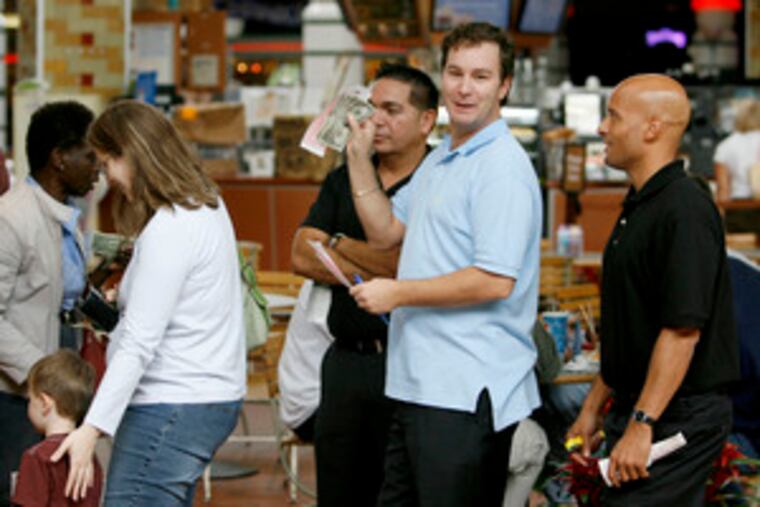Lottery exuberance actually rational, prof says

The bigger lotteries get, the faster they grow.
Much faster.
Last night, nobody had all the numbers drawn in Mega Millions -- they were 4, 21, 46, 51 and 53 with a Mega Ball of 5 -- so its king's ransom rolled over once again, zooming to $250 million for Tuesday's drawing.
That's a hike of $50 million -- a whopping 25 percent in just four days.
Tonight, Powerball is tempting and tantalizing with $300 million, its fourth biggest pot ever. That's up $55 million from just Wednesday.
If it doesn't hit tonight, Powerball might soar past its record of $365 million set in February last year -- and maybe even the all-time U.S. record of $390 million, set by Mega Millions in March.
Clearly, people are buying tickets by the ton.
And that's actually a rational thing, says a University of Pennsylvania mathematics professor.
Yes, the odds are staggeringly bad. Your chances of winning Powerball are less than 1 in 145 million -- and Mega Millions is even worse, 1 in 176 million. If you buy just one ticket.
But say you bought 1,000 tickets (which we're in no way recommending), chances are at least 145,000 to 1 you won't win the windfall, and 500 to 1 you'll be out at least $900. (Second- and third-place prizes are easier to win.)
Quite likely, you will lose.
Nevertheless, probability-wise, such lottery fever makes sense, said Dennis DeTurck, who's also dean of Penn's School of Arts and Sciences.
Mathematically speaking, the bigger a jackpot gets, the closer each ticket's value approaches $1, its actual cost, he explained.
To calculate a ticket's betting value, you divide your potential prize by the number of possibilities.
Powerball has about 145 million combinations (hence the 145-million-to-1 odds). And right now its cash payout is $140.1 million.
So, roughly speaking, for $1 each player is buying a chance that's nearly worth $1.
So you're getting your money's worth.
This is a much smarter bet, he says, than playing when the jackpot is low.
After Powerball, say, reboots to $15 million -- with a cash payout of about $7 million -- that $1 bet is worth about 5 cents.
"So it's almost silly to buy a ticket at the beginning," he said.
"Of course, people who have won that jackpot would argue with that reasoning," he added.
An exact calculation of each ticket's value, by the way, would have to factor those dreaded
taxes and possibilities of splitting pots or winning other prizes, he said.
In last night's Mega Millions, four tickets sold in New Jersey won $250,000 for having the first five numbers but not the Mega Ball. Eight tickets in other states can cash in likewise.
Now wait a minute, another student of lotteries says.
It's far from smart to play a major multistate lottery hoping for lesser prizes, said Gail Howard, author of The Lottery Master Guide.
These lotteries overwhelmingly stuff their prize money into the top prize, she said.
And she's right.
Your odds of winning $200,00 in tonight's Powerball are a measly 1 in $3.5 million.
Compare that to tonight's Pick 5: 1 in 575,757. Almost seven times less bad.
So if $200,000 would change your life enough, Pick 5's the way to go, she said.
Powerball is played in Pennsylvania, Delaware, 27 other states and Washington, D.C.
Mega Millions tickets are sold in New Jersey, Maryland, New York and 9 other states.
For more information, go to www.powerball.com or www.megamillions.com.